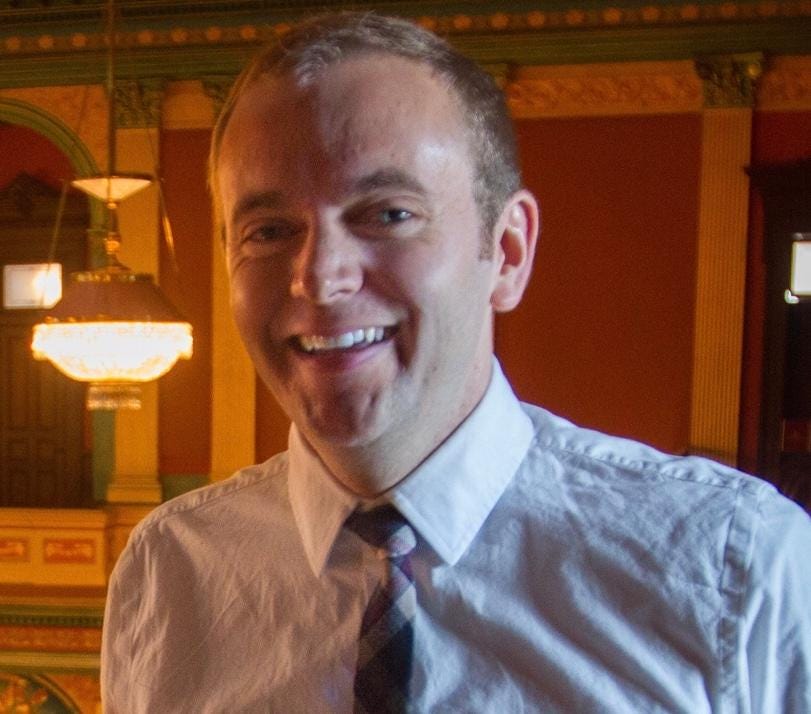Mystery money fuels campaign to limit Whitmer's emergency powers
 Craig Mauger
Craig MaugerLansing — The group collecting petitions to limit Gov. Gretchen Whitmer's emergency powers is primarily being funded by a nonprofit that doesn't have to disclose its donors.
Michigan Citizens for Fiscal Responsibility, a Lansing-based organization with ties to Senate Republicans, gave $660,200 to Unlock Michigan from June 9 through July 20, according to a new campaign finance report. Unlock Michigan is the ballot committee that wants to repeal a 1945 law that allows the governor to declare a state of emergency and keep the declaration in place without input or approval from the Legislature.
The emergency declaration is what allows a governor to take unilateral actions, such as requiring masks to be worn in public spaces or issuing a stay-at-home order. The group needs to collect more than 340,000 signatures to initiate the repeal, which Whitmer couldn't veto if the GOP-controlled Legislature approved.
Unlock Michigan's supporters argue that elected lawmakers should have a role in the state's decision-making process during the pandemic. Whitmer, a Democrat, has countered that any attempt to limit her powers during the crisis is "irresponsible, dangerous and foolish."
Unlock Michigan released its first campaign finance disclosure on Monday. Of the $765,024 the group raised through July 20, 86% of the money came from Michigan Citizens for Fiscal Responsibility, which spent about $1.1 million backing GOP Michigan Senate candidates in 2018, according to the Michigan Campaign Finance Network.
The organization's board has also featured employees of a consulting firm that works with Senate Republicans. The nonprofit is listed at the same address as the consulting firm in Lansing, according to the disclosures.
Under Michigan law, ballot proposal committees, like Unlock Michigan, can receive money from corporate donors and unions, including nonprofits that raise their funds from elsewhere. The chain of giving effectively conceals the original source of the money.
"Unlock Michigan fully complies with all campaign finance disclosure requirements," said Fred Wszolek, the committee's spokesman. "As of this morning, we have more than 1,000 individual contributors and more than 40,000 grassroots activists involved in signature collection."
He added, "Unlock Michigan does not control the reporting requirements."
Sen. Curtis Hertel, D-East Lansing, countered that Senate Republicans "made the laws." The committee is using "unlimited corporate donations that are unknown to anybody" to try get around a democratically elected governor, he said.
Hertel said he wanted to know whether the donors to Michigan Citizens for Fiscal Responsibility knew their money is being used this way.
“I guess we can’t ask them because we don’t know who they are," Hertel said.
Mark Fisk, spokesman for Keep Michigan Safe, which is opposing the Unlock Michigan proposal, labeled the group's plan a partisan power grab.
"We urge the public to refuse to sign these petitions because doing so will undermine the ability of our elected leaders and medical experts to keep Michigan families safe during the pandemic," Fisk said. "And if we can’t keep people safe, the economy, small businesses and workers will continue to struggle."
Keep Michigan Safe didn't report any contributions as of July 20.
Unlock Michigan disclosed 859 individual contributions on its new report, which covered a period from June 1, when the committee formed, through July 20. Many individual donors giving less than $500 each. The committee also reported spending $300,000 on printing and circulating petitions on June 25 and about $89,000 on digital advertising.

The only other donors that gave more than $1,000 to the effort were Dearborn-based Edward C. Levy Co., an asphalt and concrete company, which gave $30,000, and Robert Thompson, president of McCoig Holdings, a concrete supplier, who gave $25,000.
But Michigan Citizens for Fiscal Responsibility was easily the largest financial supporter. The nonprofit organization formed in 2010, according to state business records.
Over the years, its board has featured Republican political consultants. For 2019, Heather Lombardini was listed as the organization's president, according to a business filing with the state. Lombardini is also president and managing partner of the Lansing political consulting arm of the national public relations firm Lambert, according to the company's website.
Lombardini and an attorney for Michigan Citizens for Fiscal Responsibility didn't immediately respond to a request for comment.
Lambert is a consulting firm with clients that include Michigan Senate Republicans. The Senate Republican Campaign Committee reported paying Lambert $28,000 for consulting services from Jan. 1 through April 20, according to campaign finance disclosures.
Michigan Citizens for Fiscal Responsibility reported raising $2.1 million and spending $3.7 million in 2018, according to a tax filing the organization previously released to The Detroit News. The group reported having $21,846 in assets available at the end of 2018.
According to a list of contribution amounts — the list didn't have to include the names of donors — five individuals, corporations or groups gave at least $100,000 each to Michigan Citizens for Fiscal Responsibility in 2018, according to the filing.
On the filing, the group said its mission was "to inform and educate the public on fiscal policy issues."
In May, Senate Majority Leader Mike Shirkey, R-Clarklake, called a petition drive to limit Whitmer's emergency powers "probably the No. 1 priority."
Shirkey is "involved" with the Unlock Michigan effort, said Amber McCann, Shirkey's spokeswoman.
Bill Ballenger, a former GOP state lawmaker and longtime political observer in Michigan, said the largest funding source of Unlock Michigan isn't likely to be a big deal for the public. Voters and residents have been "saturated" with stories about "dark money" while many ballot campaigns have previously been funded by nonprofit groups, he said.
"I don’t think it really resonates with voters and the public broadly," Ballenger added.
cmauger@detroitnews.com